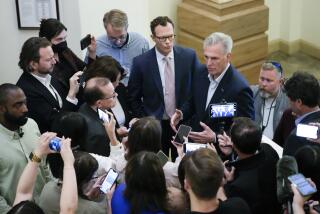U.S., Japan Seek to Avoid Trade Rupture : Economy: High-level talks stretch past midnight in effort to avoid sanctions against Tokyo. Outcome will affect direction of markets, electoral politics.
WASHINGTON — High-level U.S. and Japanese negotiators met into the night Friday, hoping to find enough common ground to avoid a rupture in trade relations that could further weaken the dollar and send crucial economic relations between the two countries into a tailspin.
Japanese Trade Minister Ryutaro Hashimoto ended talks with U.S. Trade Representative Mickey Kantor at midnight, saying the two men planned to meet again. The talks were expected to go well past the midnight Friday deadline set by the United States as both sides seek ways to head off steps that could lead to the imposition of trade sanctions against Japan--and upset the Clinton Administration’s effort to win approval of a global trade agreement.
Kantor scheduled a midday news conference today to announce what actions the United States planned to take.
The two sides were described by a senior U.S. aide as “pretty close” to an agreement covering U.S. insurance companies’ access to the Japanese market. But a wider gulf remained in the effort to open Japan to greater purchases of U.S. automobiles, auto parts and glass. Both sides characterized the negotiators as relatively close to an agreement covering the Japanese government’s purchases of foreign telecommunications and medical equipment.
The results of the talks could echo throughout the sensitive arenas of trade and electoral politics, as the White House tries to use U.S. trade laws to pry open the potentially lucrative Japanese market to U.S. companies while presenting voters next month with a clear foreign policy triumph that would put dollars in American pockets.
In addition, pressure on both sides to reach an agreement was increased by the potential for disruptions in economic and diplomatic arenas beyond the talks: Failure to reach agreement could push the value of the yen higher and the dollar lower and damage support for the global trade pact facing a vote in Congress.
It could also create a sour atmosphere at the Asia Pacific Economic Cooperation talks that Clinton is to attend in Indonesia in November.
Administration and industry officials said that failure to reach significant agreements sometime this morning would likely trigger steps leading to sanctions targeted at Japan’s $4.5-billion to $5-billion industry that supplies flat glass for windows and other purposes. Less than 1% of Japan’s supply comes from the United States.
Kantor also is trying to make inroads in the auto industry, which accounts for about two-thirds of the United States’ $60-billion trade deficit with Japan. Kantor has demanded that the Japanese government pressure its auto industry to buy $40 billion worth of parts, representing 20% of its market, from the United States, a demand that Tokyo has rejected.
If the United States refuses to retreat from this “astronomical figure,” and, indeed, does not drop its demand for such specific targets, said Kiyohiko Nanao, economics counselor of the Japanese Embassy, the talks will fall apart and with them the progress made in other areas.
For the second time this week, Japanese Trade Minister Hashimoto flew to Washington from Tokyo, to join Foreign Minister Yohei Kono late Friday evening in talks with Kantor at the modest offices of the U.S. trade representative one block west of the White House.
“We are at the last stretch,” Nanao said.
The insurmountable obstacle Friday, according to Japanese officials, remained unchanged from the start of the negotiations in July, 1993. That is the United States’ insistence that some form of “objective criteria” be found to measure the progress of U.S. companies in the Japanese market.
Japan has argued that any specific targets would amount to interference in free trade and that it cannot force industries or consumers to buy a specified amount of U.S. products.
With little expectation that the negotiators would be able to bridge all the gaps in the overnight end game, U.S. officials indicated--and Japanese officials privately agreed--that the likely outcome would be limited agreements covering the insurance industry and Japanese government procurement, coupled with movement toward limited sanctions imposed at some distant point, or antitrust suits intended to put greater pressure on Japan to buy flat glass and auto parts from U.S. manufacturers.
Japanese officials said they hope that, if full agreement is not reached, they could head off sanctions by proposing that the two sides accept the limited agreements already achieved, in insurance and government procurement, and agree to continue the automotive and flat glass talks after a break.
In pressing such a course, they were taking the chance that a split in the U.S. government, with the State Department and Treasury said to be leaning toward reconciliation, would make it difficult for the trade office to line up support for imposition of sanctions.
Seven months ago, a U.S.-Japanese meeting at the White House ended in failure, sending the dollar to new lows against the yen--making Japanese products more expensive in the United States and thus less desirable.
More to Read
Sign up for Essential California
The most important California stories and recommendations in your inbox every morning.
You may occasionally receive promotional content from the Los Angeles Times.










